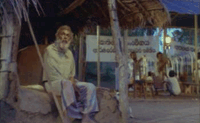For the impoverished villagers of Prasanna Vithanage’s Death on a Full Moon Day, the civil war is an abstraction, a distant reality removed from the struggles of everyday life. The idea of war as self-reinforcing, interwoven ritual is prefigured in the opening sound of a Buddhist chant (alluding to the solemn observance of the full moon) that is heard amid images of a rural landscape, creating a sense of disrupted nature in the subsequent shots of a lone automobile traversing a dirt road in the early hours of the morning, and a blind, elderly villager, Wannihami (Joe Abeywickrama) walking barefoot through a parched lakebed to fetch water. However, the advent of a full moon proves far from auspicious, the automobile seen earlier revealed to be a hearse transporting soldiers en route to Wannihami’s house to escort the casket of his only son, Bandara back to the village for a proper burial. With the family unable to find closure after the soldiers refuse to allow the opening of the sealed casket for a viewing (presumably in deference to the condition of the remains after he was killed in a landmine explosion), Wannihami refuses to acknowledge that his son has been killed during a bloody skirmish, a skepticism that is seemingly reinforced when a letter from Bandara later arrives in anticipation of his impending homecoming for his younger sister, Sunanda’s (Priyanka Samaraweera) wedding.
Vithanage incisively parallels religious themes of cycle, enlightenment, and renewal within the context of endemic poverty in order to expose the dysfunctional institutions that help perpetuate the inhumanity (and unnaturality) of the protracted civil war. In retrospect, Bandara’s expressed hopes of providing a better life for his family by becoming a soldier reflects the villagers’ sense of despair as well, where young men from the provinces (such as Sunanda’s suitor, Somay), unable to eke out a decent living through farming, increasingly see the military as the only means to improve their circumstances which, in turn, indirectly serve to perpetuate a conflict that fosters destabilization (in one episode, the government authorizes the addition of a bus stop in the village in memory of Bandara, linking the seemingly noble pursuit of socioeconomic development with politically-motivated appeasement). This interrelation is further implied in the military’s contingency death benefits that preclude independent investigation, where acceptance of payment represents a tacit compensation for silence and complicity. Framed against Wannihami’s defiance, the breaking of the seal (and consequently, the metaphoric covenant with these exploitive institutions) is also a humble act of enlightenment – a search for truth in the face of isolation, adversity, and dispossession.
© Acquarello 2009. All rights reserved.
